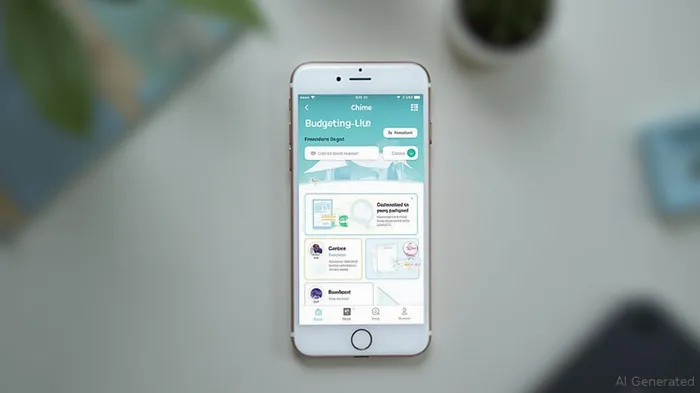Chime's Fintech Future: Navigating Regulatory Shifts to Capture Long-Term Growth
The fintech revolution has reshaped financial services, but its leaders must now balance innovation with evolving regulatory demands. ChimeCHYM--, one of the sector's most ambitious disruptors, has positioned itself at the crossroads of growth and governance. As it prepares for its IPO debut, the question is clear: Can Chime sustain its momentum in an era of tightening regulations while capitalizing on its user-centric model?
A Foundation of Scale and Innovation
Chime's success hinges on its ability to attract and retain customers through simplicity and cost efficiency. With over 38 million users—a 70% increase since 2021—the company has built a loyal base by eliminating fees, offering instant access to earned wages, and integrating financial tools like tax filing and loans directly into its app.  . This user growth, paired with a 30% revenue jump to $1.3 billion in 2023, underscores its potential as a scalable fintech platform.
. This user growth, paired with a 30% revenue jump to $1.3 billion in 2023, underscores its potential as a scalable fintech platform.
Yet Chime's recent product launches signal an aggressive push to expand beyond basic banking. The introduction of Instant Loans (up to $500 at fixed rates) and SpotMe, a fee-free overdraft service tied to its Secured Credit Builder card, illustrates its ambition to become a full-service financial partner. Meanwhile, its AI-driven analytics and plans to invest IPO proceeds in acquisitions could further solidify its edge.
Regulatory Crossroads: Strengths and Risks
Chime's model relies on partnerships with federally insured banks like The Bancorp and Stride, which handle FDIC-insured deposits and compliance. This structure insulates Chime from the capital and regulatory burdens of a traditional bank charter but introduces dependency risks. Recent regulatory shifts—such as the CFPB's ban on including medical debt in credit reports—force fintechs to recalibrate underwriting practices, potentially limiting revenue from lending.
The company also faces scrutiny over its $200 million annual loss in 2023, driven by aggressive marketing to acquire users. While profitability in Q1 2024 offers hope, sustaining margins amid rising competition from legacy banks (e.g., JPMorgan's Chase Bank Plus) and rivals like SoFi remains a challenge.
The Regulatory Environment: Opportunities and Headwinds
The fintech sector is navigating a complex regulatory landscape. Chime's reliance on third-party banks means it must monitor changes like the Beneficial Ownership reporting rules and Payday Loan Protection regulations. While these rules broadly benefit consumers, they require Chime to invest in compliance systems, diverting resources from growth.
Conversely, the delayed FDIC signage requirements and inflation-adjusted penalties offer short-term relief. Chime's transparent SEC filings and IPO readiness—securing SEC approval in just days—highlight its preparedness for public scrutiny. However, its valuation at $9.1 billion (post-IPO) reflects skepticism about its ability to replicate past growth in a slower macroeconomic environment.
Investment Thesis: Buy for Long-Term Fintech Exposure
Chime's strengths—user growth, product diversification, and a fee-free model—position it as a compelling long-term play in fintech. Its IPO offers investors exposure to a sector poised for consolidation, with Chime potentially acquiring niche players to bolster its offerings.
. However, investors should temper enthusiasm with caution. Regulatory headwinds, thin margins, and competition demand a focus on Chime's execution. Key metrics to watch include:
- User retention rates (Chime's app engagement is critical to sustaining revenue).
- Lending profitability (success of Instant Loans and SpotMe).
- Regulatory compliance costs (impact on margins).
Final Analysis
Chime is not without risks, but its IPO marks a pivotal step in its journey from disruptor to institution. For long-term investors seeking exposure to the fintech boom, Chime's scale, innovation, and strategic agility make it a worthy consideration—provided they acknowledge the regulatory and competitive hurdles ahead. As the sector matures, those who balance growth with governance will lead. Chime is positioning itself for that role, but its success will depend on navigating the regulatory crossroads with as much deftness as it has the financial status quo.
Recommendation: Buy for a long-term horizon, with a focus on Chime's potential to dominate in fee-free digital banking. Monitor quarterly updates on lending margins and regulatory compliance for near-term cues.
Tracking the pulse of global finance, one headline at a time.
Latest Articles
Stay ahead of the market.
Get curated U.S. market news, insights and key dates delivered to your inbox.

Comments
No comments yet